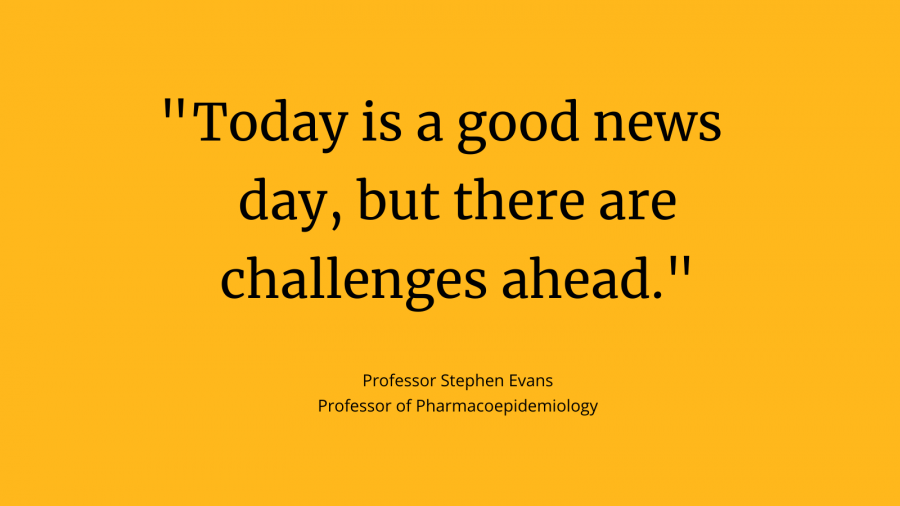Expert comment - UK approval of Pfizer/BioNTech COVID-19 vaccine
2 December 2020 London School of Hygiene & Tropical Medicine London School of Hygiene & Tropical Medicine https://lshtm.ac.uk/themes/custom/lshtm/images/lshtm-logo-black.png
Quote from Prof Stephen Evans: "Today is a good news day, but there are challenges ahead"
The UK is the first country to approve the vaccine for mass vaccination. Professors Stephen Evans and Liam Smeeth react to the news.
Prof Stephen Evans, Professor of Pharmacoepidemiology, London School of Hygiene & Tropical Medicine, said:
Today is a good news day. However, we do have to acknowledge several key things that are not being said by everyone
1) We will not be able to change distancing, mask wearing etc for quite some time- months at least, and we don’t yet know when or whether that will stop
2) Making vaccination available is not enough; people need to be convinced so that they do accept being vaccinated
3) We do not yet know about effects of vaccines that are extremely rare, and before we do there will be scares about adverse effects that are coincidental in fact, but perceived by some as being caused by the vaccine. As soon as we vaccinate very large numbers of people there will be coincidental deaths and strokes that occur in elderly people soon after receiving a vaccine. The MHRA and other groups are poised to study these things and to ensure that they are not in fact CAUSED by vaccination, but such events we know will happen, but jumping to conclusions will be unwise
4) Although we are, physically, an Island, viruses do not respect borders. “No country is an island entire of itself; every country is a piece of the world, a part of the world” (adapted from John Donne 1624). We need to ensure low and middle income countries must also get access to effective vaccination. Selfishness will rebound.”
Prof Liam Smeeth, GP, Professor of Clinical Epidemiology, and Dean of the Faculty of Epidemiology and Population Health, London School of Hygiene & Tropical Medicine, said:
“The continued progress on vaccines is fantastic news. A route towards a much better situation in the UK is becoming clear. A further circuit breaker in January or possibly February is likely to be needed. But, it is realistic to hope that by March or April the vast majority of older people, care home residents, and those with severe conditions will have been immunised. We can then work towards wider immunisation – with ideally much of the population covered in time for next winter. Life won’t ever be the same as it was before COVID-19, but it will feel a whole lot better than now.
“For the foreseeable future – and maybe forever – we are very unlikely to reach the situation we are in with smallpox (gone), polio (almost gone), or measles (controlled in populations with high enough vaccine coverage). Instead, we are going to need to find ways to fairly happily live alongside this virus.
“Maintaining public confidence in the vaccine will be key. Complete, timely data on who has been vaccinated, where, and when will be of enormous importance as we continue to monitor not just coverage, but also safety and effectiveness. Ensuring this data is entered into peoples’ NHS general practice records is crucial. General practice has proven ability to rapidly vaccinate large sections of the population, and with adequate support, is ideally placed to lead the COVID-19 vaccination programme.
“Ensuring equitable global distribution remains a major challenge. And equity is the key. Many low-income countries with little resilience in their health systems and wider infrastructures face unimaginable challenges from COVID-19, and distribution of vaccines according to need will require affirmative action from richer countries, working with the World Health Organisation and other key players.”
If you enjoyed this article and would like to build a career in global health, we offer a range of MSc programmes covering health and data, infectious and tropical diseases, population health, and public health and policy.
Available on campus or online, including flexible study that works around your work and home life, be part of a global community at the UK's no.1 public health university.